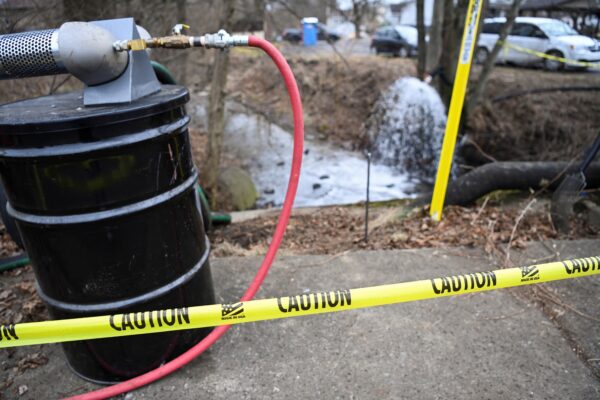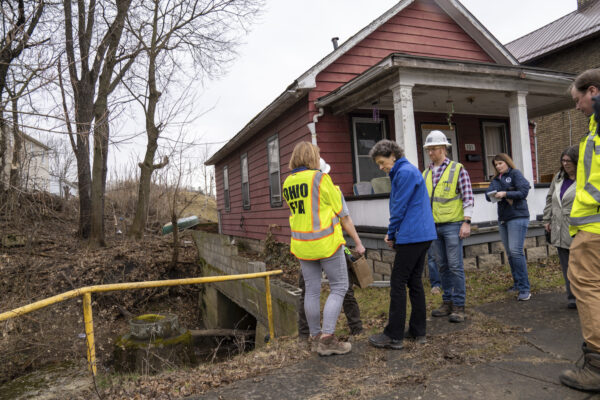- Watch The JD Rucker Show every day to be truly informed.
Locals who live near the train derailment and release of toxic chemicals near East Palestine, Ohio, have complained about various health problems since the incident unfolded earlier this month, including rashes, headaches, and other issues. And they’ve expressed concerns that these new symptoms may be tied to the chemicals that were burned or released.
The Feb. 3 derailment triggered officials to initiate a controlled release and burn of various chemicals as they cited concerns that those materials would explode and send out deadly shrapnel. Chemicals carried on the Norfolk Southern-operated train include toxic vinyl chloride gas, which was vented and burned, releasing a large cloud of black smoke that hung over the area for days.
A plume of chemicals from the train derailment was also detected heading down the Ohio River, although some Ohio environmental officials assert that they may largely be fire retardant substances used to put out the fire. Other chemicals carried on the train include butyl acrylate, ethylene glycol monobutyl ether acetate, and 2-ethylhexyl acrylate, the U.S. Environmental Protection Agency said (pdf).
Residents of East Palestine were told they could return to their homes on Feb. 8. Since then, there have been reports from locals of adverse health events they’ve suffered amid separate reports of animals, including fish and chickens, dying off.
“When we went back on the 10th, that’s when we decided that we couldn’t raise our kids here,” local Amanda Greathouse told CNN, adding that in the area, there was a smell that “reminded me of hair perming solution.”
About 30 minutes after returning home earlier this month, she developed nausea and a rash, Greathouse told the network. Her house is located about a block from the train derailment site.
“When we left, I had a rash on my skin on my arm, and my eyes were burning for a few days after that,” added Greathouse, who said she has two preschool-age children.
“The chemical smell was so strong that it made me nauseous,” Greathouse said. “I just wanted to quickly pick up what I needed and leave. I only took a few pieces of clothes because even the clothes smelled like chemicals, and I’m afraid to put them on my kids.”

Another local, Katlyn Schwarzwaelder, said she and her boyfriend, Chris, returned home to East Palestine earlier this month. A rash broke out almost instantly after she came back, she told NewsNation.
“I undressed to get into the shower, and I had a rash all over the side of my face on both sides and all over my chest,” Schwarzwaelder said, adding: “My boyfriend Chris also had a rash on his left side, and I mean to this moment, right now, I have just a really low-grade constant headache.”
Dave Anderson, a farmer in nearby New Galilee, Pennsylvania, told the Washington Post last week that both he and his family have experienced a burning sensation in the mouth, tongue, and lips about a day after the crash. Other symptoms reported include tongue swelling, runny nose, and watery eyes.
Anderson added that “our tongues still feel like they have been scalded—like if you drank something that was too hot.”

“I’m going to East Palestine and will get a glass of water, and I’m going to ask him to drink it because I don’t believe it,” said Dave Anderson, a farmer in nearby New Galilee, Pennsylvania. Anderson, a plaintiff in a class-action lawsuit against Norfolk Southern, said his cattle have had diarrhea since the disaster.
A spokesman for DeWine told the Washington Post last Thursday that no doctors have seen patients who have been able to identify the chemical release as the cause of their symptoms. “There’s usually another explanation for those symptoms,” including colds and influenza, spokesman Dan Tierney told the paper, although he did not provide specific evidence for that statement.
And over the weekend, the CEO of Norfolk Southern, Alan Shaw, visited East Palestine and again vowed to clean up the crash site. His firm is already facing several class-action lawsuits connected to the derailment.
“I know there are still a lot of questions without answers. I know you’re tired. I know you’re worried,” Shaw said in a statement. “We will not let you down.”
Article cross-posted from our premium news partners at The Epoch Times.
What Would You Do If Pharmacies Couldn’t Provide You With Crucial Medications or Antibiotics?
The medication supply chain from China and India is more fragile than ever since Covid. The US is not equipped to handle our pharmaceutical needs. We’ve already seen shortages with antibiotics and other medications in recent months and pharmaceutical challenges are becoming more frequent today.
Our partners at Jase Medical offer a simple solution for Americans to be prepared in case things go south. Their “Jase Case” gives Americans emergency antibiotics they can store away while their “Jase Daily” offers a wide array of prescription drugs to treat the ailments most common to Americans.
They do this through a process that embraces medical freedom. Their secure online form allows board-certified physicians to prescribe the needed drugs. They are then delivered directly to the customer from their pharmacy network. The physicians are available to answer treatment related questions.





